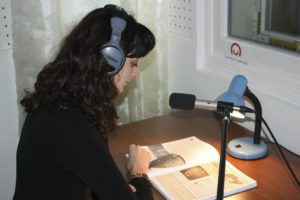Name a song from your teenage years that sticks with you
March 14, 2018 • 7 Comments • Posted in careers/jobs for people who are blind, guest blog, memoir writing, politics, writing promptsI’m piggybacking on the Mondays with Mike post about civics this week with an essay written by Mel Washburn. Mel is a writer in one of the memoir-writing classes I lead for The Village Chicago, and the essay he came up with for the prompt, “A Song from Your Teenage Years That Sticks With You” talks about music and protest movements 50 years ago.
by Mel Washburn
When I became a teenager in December 1957, I was already weary of the music made for teenagers by singers like Pat Boone, Debby Reynolds and Elvis Presley. Rock and Roll, which had seemed so fresh a few years before, was drowning in sticky-sweet syrup.

The March on Washington, 1965.
I was attracted to a new kind of music, sung by “Peter Paul and Mary” or Pete Seeger or Harry Belafonte. Acoustic music. Truthful music. So-called folk music.
In 1960, Joan Baez released her first album of old English and Scottish ballads. To me and my friends, her music seemed beautiful, almost holy.
In 1962, Bob Dylan released his first album. Soon he was creating sardonic and satirical music that reflected the way my friends and I felt about our times and our society.
In 1964 – my last year as a teenager – Dylan released an album that was the Handel’s Messiah of youth protest: The Times They Are A-Changin’. My favorite song on that album was “When the Ship Comes In,” which describes metaphorically the morning when we, the young, vanquish forever the forces of repression and reaction.
On April 17, 1965 (four months after my 20th birthday) I was standing on the National Mall near the Washington Monument with 20,000 people. Most of us were under the age of 30, and we were there to demand an end to the War in Vietnam. The sky was blue. The day was warm. The crowd was peaceful. We heard speeches from student leaders who had organized the gathering and from Senator Ernest Gruening, who was one of only two senators who voted against the Tonkin Gulf Resolution that had started the war. Then Joan Baez stepped to the microphone.
I was standing with two old friends, Norman Vance and Rick Clinebell, and a group of high school girls from Manhattan. We were all thrilled to be there and were doubly thrilled when Ms. Baez began singing our anthem: “When the Ship Comes In.” We listened in rapture as she reached the last stanzas:
Oh the foes will rise
With the sleep in their eyes
And they’ll jerk from their beds and think they’re dreamin’
But they’ll pinch themselves and squeal
And know that it’s for real
The hour that the ship comes in.Then they’ll raise their hands
Sayin’ we’ll meet all your demands
But we’ll shout from the bow your days are numbered
And like Pharaoh’s tribe
They’ll be drownded in the tide
And like Goliath, they’ll be conquered.
How could it not happen? We were young, we were numerous, we were the future. Eventually the evil, the hateful people would be drowned in the tide of our indignation.
In that moment, I believed it. The girls from Manhattan believed it. The kids who had come to Washington from a hundred different high schools and colleges believed it. We could all see clearly what was wrong with our society and our government.
What we didn’t see was that most people in America liked things just the way they were.


